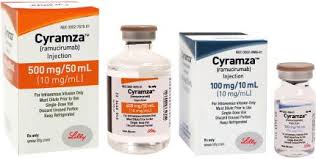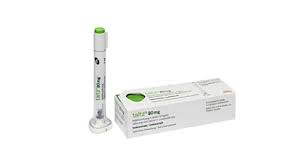Lilly Korea said Wednesday that Cyramza (ingredient name: Ramucirumab), its target immunotherapy, has received a new indication for metastatic colorectal cancer and metastatic non-small cell lung cancer (NSCLC), from the Ministry of Food and Drug Safety.

As a result, Cyramza now has three indications, including its previous indication for progressive and metastatic gastrointestinal cancer.
According to the ministry’s approval, Cyramza will be available in combination with folinic acid, fluorouracil and irinotecan (FOLFIRI) for patients with advanced metastatic colorectal cancer during or after treatment, including bevacizumab, oxaliplatin, and fluoropyrimidine.
The drug has also won the nod as a combination therapy with docetaxel in patients with metastatic NSCLC during or after chemotherapy, including platinum. However, patients with metastatic NSCLC who have epidermal growth factor receptor (EGFR) or anaplastic lymphoma kinase (ALK) gene mutations may receive Cyramza treatment only if the disease progresses even after they get treatment with licensed medications for these mutations.
The ministry gave additional indications for metastatic colorectal and metastatic NSCLC after confirming the results for two global, double-blinded, phase 3 clinical studies -- RAISE and REVEL.
“The added metastatic NSCLC and metastatic colorectal cancer indications are significant in that they offer new therapeutic options in the field of chemotherapy, which has had a high unmet need both socially and medically,” Lilly Korea CEO Paul Henry Huibers said. “The company will do its best to increase access to treatment for patients suffering from NSCLC and colorectal cancer.”
Meanwhile, Lilly Korea also received additional indications for Taltz, an interleukin 17A inhibitor, in treating adult active psoriatic arthritis from the MFDS.

With the new approval, Taltz has received indications for two diseases, including the previously approved indication for severe psoriasis.
Taltz is an interleukin 17A inhibitor that selectively inhibits inflammation by binding to interleukin 17A protein, which causes an inflammatory response to psoriatic arthritis.
Doctors can administer the drug when the response to previously disease-modifying antirheumatic drugs (DMARDs) is inadequate. They may also use the drug alone or in combination with conventional disease modifying anti-rheumatic drugs (cDMARDs) for the treatment of adult patients with non-tolerable active psoriatic arthritis.
The recommended dose of Taltz is 160 mg (two injections of 80 mg) at week zero, and then 80 mg every four weeks after that. For patients with active psoriatic arthritis with moderate to severe psoriasis, the recommended dose is the same as that of treating psoriasis alone.
The company confirmed the efficacy and safety profile for Taltz in treating psoriatic arthritis through SPIRIT-P1 and SPIRIT-P2 clinical trials, which were both randomized double-blind placebo-controlled study participated by over 670 psoriatic arthritis patients.
“The company expects that Taltz will contribute to improving the quality of life of more domestic patients as it received approval for sclerotic psoriasis and psoriatic arthritis,” Huibers said.

